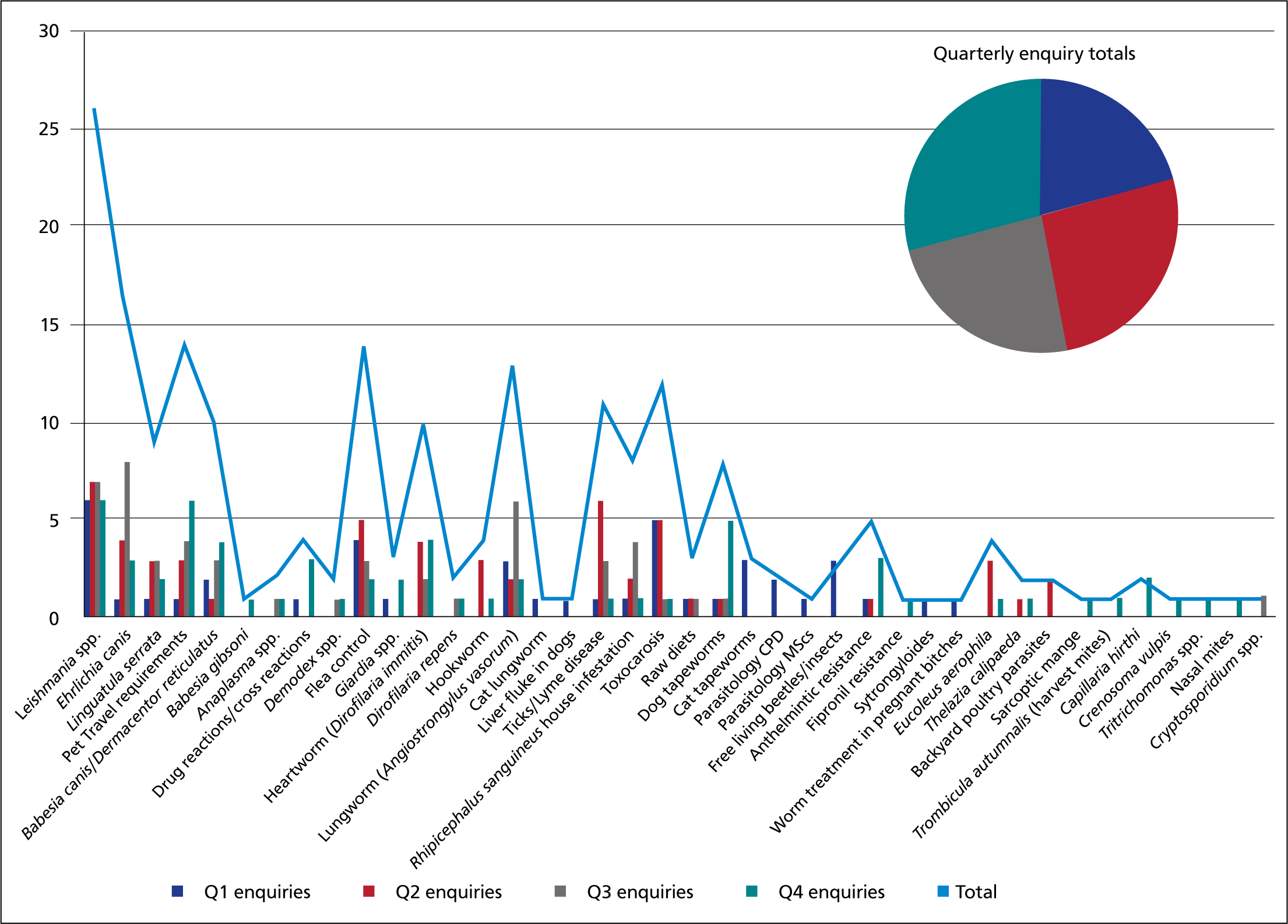Drawing from information published in the ESCCAP UK & Ireland Parasite Forecasts (www.esccapuk.org.uk/parasite-forecast-uk/), this article provides a brief ‘roundup’ of parasitology-related activities and events in 2018, identifies key themes and analyses trends and interest from the public.
Key themes and hot topics
The big three themes of 2018 were:
Illegal and legal pet importation
Continuing from 2017, 2018 has highlighted the increasing problems of illegal and legal pet importation. Campaigns such as the BVA's ‘Trojan dog’ campaign and increasing numbers of exotic parasites being diagnosed in dogs from all over the world has spurred interest in this topic. BVA's spring 2018 ‘Voice of the Veterinary Profession’ survey showed that 29% of vets in practice have seen at least one suspected illegal puppy importation case in the last 12 months (BVA, 2018). BVA surveys have also revealed more than nine out of ten companion animal vets in the UK are concerned about the import of rescue dogs from abroad, with three-quarters feeling the numbers have increased over the last year. Reports to ESCCAP UK & Ireland reflect this with cases of leishmaniosis, heartworm, Ehrlichia canis and Linguatula serrata in imported and travelled dogs being consistently high throughout 2018.
Brexit and legislative changes
Considering Brexit, the veterinary profession worked hard throughout 2018 to convey to the government the importance of securing legislation to safeguard both the veterinary workforce and UK animal/public health and welfare. Pet Travel regulations have naturally been a major focus for the whole veterinary profession and will continue to be so throughout 2019. As well as the logistics for preparing for possible additional requirements for EU travel such as rabies blood testing, the Pet Travel Scheme has also been up for renegotiation.
Domestic parasites
A late spring in 2018 with heavy snowfall well into March lulled many people into a false sense of security regarding domestic parasites such as fleas and ticks. However, flea and tick numbers persevered and remained high throughout 2018. High temperatures and humidity during the summer were ideal flea breeding conditions, raising concerns about flea house infestations and transmission for vector-borne diseases such as bartonellosis. An early cold snap during September resulted in many homes turning on their central heating earlier than anticipated, which provided the perfect environment and breeding ground for household flea infestations. Then a milder autumn and winter to date has further advantaged fleas living both in the home and in the outside environment. This will pose problems for those taking a seasonal approach to flea control. Likewise, there is growing evidence to support the view that the current UK climate allows questing and feeding of Ixodes spp. ticks all year round. This means that owners and veterinary professionals should always be aware of potential tick attachment to pets and owners.
ESCCAP UK & Ireland enquiry data
Each year, ESCCAP UK & Ireland provide an enquiry answering service for the public and produce quarterly reports of the topics raised in order to identify possible trends (see Figure 1).

In 2018 as a whole, despite interest in exotica remaining high, the warm, humid weather in the UK year provided perfect conditions for fleas and ticks to thrive. This, combined with newly published research generating further interest, meant an increase in enquires about domestic parasites. This can be seen reflected in the number of flea, tick/Lyme disease, lungworm and toxocarosis enquiries received in 2018 (approximately 25% of all enquiries).
Notable differences (and similarities!) can be seen when comparing 2017 enquiries to 2018. In both cases, enquiries about Leishmania spp. came out on top. But 2018 saw a significant increase in enquiries about Ehrlichia canis, making it the second highest enquiry topic in 2018 with nearly 8% of all enquiries. Pet travel enquiries were also seen to double in 2018, along with Dirofilaria immitis (heartworm) enquiries. Enquiries about Rhipicephalus sanguineus house infestations increased fourfold, however, enquiries about cat tapeworms reduced by two thirds. Top domestic parasite enquiries were about flea control, lungworm, toxocarosis, ticks/Lyme disease and dog tapeworms. A notable newcomer to enquiries in 2018 was about anthelmintic and fipronil resistance, which accounted for nearly 3% of all enquiries.
Upcoming research in 2019
HyData
HyData UK is a 3-year (2016-2018) multi-centre collaborative study investigating the national distribution of Echinococcus granulosus in high-risk dog populations (hunting hounds, farm dogs and pet dogs in rural areas), livestock (cattle, sheep) and horses at slaughter in England, Wales, Scotland and Northern Ireland (Collins et al, 2016). The study aims to build the most comprehensive picture of E. granulosus geographic distribution in the UK and explore associated risk factors for animal and human infection. Until these results become available later this year, prevention advice to pet owners must be based on lifestyle risk of the pet.
Toxocara spp. contamination study
ESCCAP UK & Ireland have funded a study, being carried out by Nottingham Vet School, investigating the prevalence of Toxocara spp. eggs in public sandpits in the UK, the degree of contamination and the risk it may pose to public health. The study will provide much needed statistics for environmental Toxocara spp. contamination.
Big Flea Project
2019 will see the publication of the Big Flea Project which will shed light on the prevalence of flea-borne pathogens such as Bartonella spp. in the UK. This information is vital to give accurate risk-based flea advice.
Seroprevalence study in dogs
ESCCAP UK & Ireland are collaborating with IDEXX Laboratories to carry out a seroprevalence study in dogs across the UK, testing for Borrelia spp. and Anaplasma spp. This will create the first meaningful data set indicating how these pathogens in Ixodes ticks are translating into infection in dogs.
Conclusion
The UK is going through a period of rapid change, both for parasite distribution, research availability and, of course, Brexit-related changes. 2019 is likely to further enhance the trends we have seen this year. With Brexit looming, interest in pet travel and legislation will increase. As the results of new studies about domestic parasites are published in 2019, this will generate further discussion.


